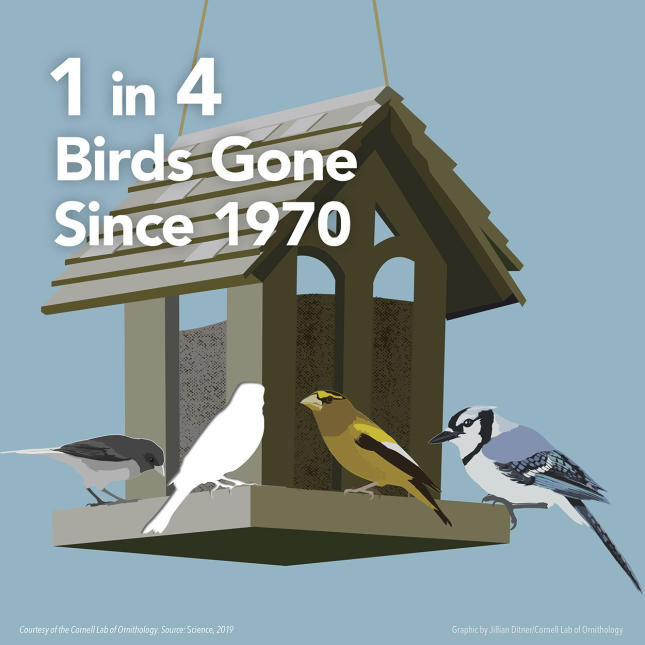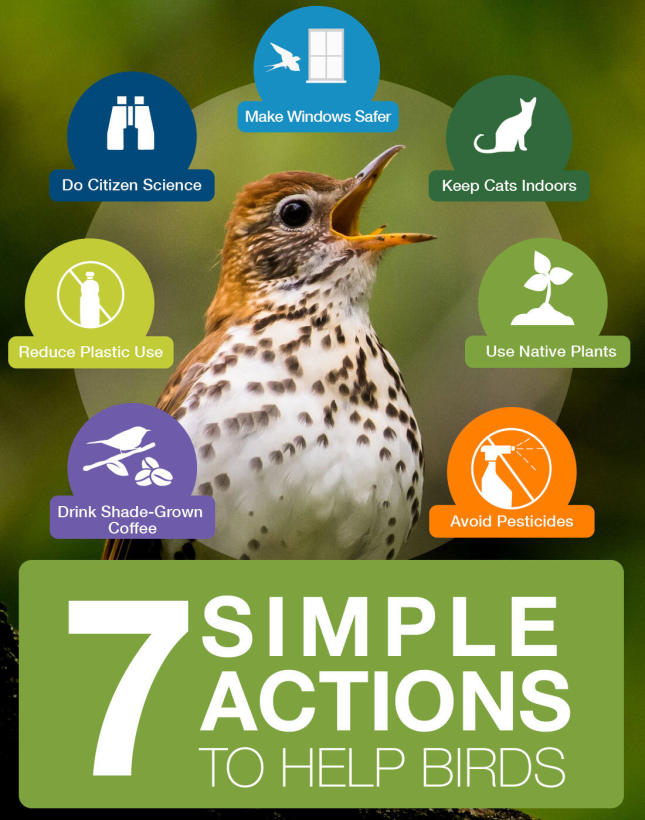Simple Ways to Save the Birds


In recent years a report was released documenting the status of bird populations. It took into account census and citizen science work done over the last 40 years. Since 1970 we have lost 29% of our breeding birds in North America. That's 2.9 BILLION BIRDS!! This dramatic decline is mostly due man made factors. In the past 50 years we've paved over more land for houses and buildings than ever before. We've removed valuable habitat for mow-able lawns. We sprayed pesticides and herbicides at such an alarming rate it turns up in water sources. In comparison to the steep decline in birds, there's been a soaring rise in plastics in our lives. Plastic that gets in the ocean and kills the birds. Many people still believe it's okay for fluffy the cat to take a few birds a year. It is not necessary for a well fed cat to be let outside to play sport with the birds. Every window surface be it on you home, office, or store has reflective abilities that will cause bird strikes. Plainly stated our generation has let the birds down. We all need to take a second look at our lifestyles and determine if we're killing the birds. A few simple changes to your home and routine can make a huge difference for not just our feathered friends, but all wildlife. Here's how:
1. Make Windows Safer, Day and Night
Collisions with windows kill thousands of birds every year, especially during migrations in the spring and fall. Birds often see the reflection of the outdoors on window glass and think they can fly right through. The other way this occurs is at night, when interior and exterior lights cause light pollution that can draw birds off course from their migration and straight into windows.
You can help prevent both of these situations from happening quite easily. Applying decals/stickers to the exterior of the windows helps break up the reflection of your yard in the glass and shows the birds there is an obstacle there. You can also reduce the amount of lights you leave on both inside and outside of your home to limit your light pollution. An added bonus: you'll also save money on your electric bill too!
2. Keep Cats Indoors
While Fluffy the Cat may be laid back and sweet when inside your home, rest assured it's a different story outside! Cats kill millions of birds, rodents, reptiles, and amphibians every year. They are highly evolved predators and it is in their nature to hunt, whether that be for food or for sport. Keeping your beloved feline inside helps prevent your local birds and wildlife from becoming an afternoon snack. It's also much safer for your cat, as it keeps them out of the way of traffic and reduces exposure to parasites and disease.
There are lots of options for keeping your cat stimulated besides letting them free-roam the outdoors. You can even still let them outside! Consider installing a catio; an enclosed outdoor space where your furry friend can lounge safely. You can also take your cat for walks with a harness and leash, just like you would your dog.
3. Reduce Lawn by Planting Native Species
Mowed lawns with non-native plantings have become a standard for suburban America. Unfortunately, it's a landscape that provides little to no support for our native wildlife, including the birds. Our native fauna evolved for millions of years alongside native plants and many of them are specialized species, meaning they can only survive if they have access to their native host plant. Caterpillars and other insects are often specialist organisms that also happen to be the primary food source for both adult and nestling birds alike. By adding a variety of native plants to your yard, you provide food for the insects and caterpillars that serve as food for the birds.
Additionally, reducing your mowed lawn in favor of native plantings helps to provide shelter for birds and other wildlife! It also makes your yard a more beautiful environment for you too.
4. Avoid Pesticides
Look for organic food choices and cut out some of the 1 billion pounds of pesticides used in the U.S. each year.
5. Drink Coffee That’s Good for Birds
Shade-grown coffees are delicious, economically beneficial to farmers, and help more than 42 species of North American songbirds.
6. Protect Our Planet From Plastics
91% of plastics are not recycled, and they take 400 years to degrade.
7. Watch Birds, Share What You See
Bird watchers are one of science’s most vital sources of data on how the ecological world is faring.
8. Join, volunteer or donate
to any of our local nature or garden organizations. They are on the forefront of maintaining and preserving land now and for the future. Mt. Cuba, The Delaware Ornithological Society, The Delaware Nature Society, The Land Conservancy for Southern Chester County, The Brandywine Red Clay Alliance, Tri-State Bird Rescue and many more are worthy of your support.
9. The Habitat you create in your backyard is vital.
It can provide food, water, shelter and places for birds to raise their young.

